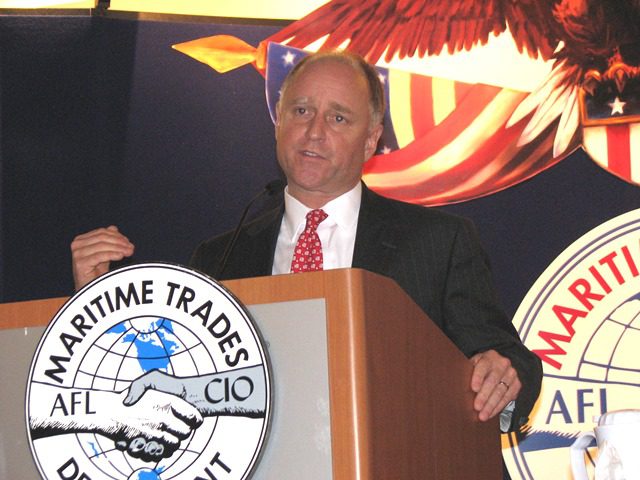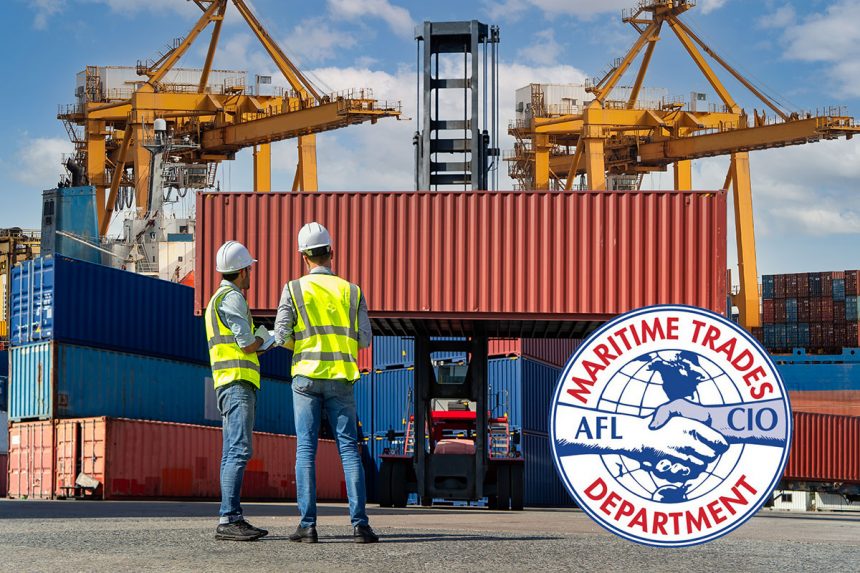
MTD Convention Coverage
The head of union-contracted Crowley Maritime Corporation sees opportunities for growth in the industry, but said such progress will require ongoing commitments to safety and partnerships.
Thomas B. Crowley Jr., chief executive officer and chairman of the board of directors, addressed the MTD Quadrennial Convention Sept. 6 in Los Angeles. He described his company’s diverse operations and emphasized the wisdom of regularly bringing stakeholders together for collaboration.
“I think the partnership that industry and labor and government have is really unique to our industry,” stated Crowley, whose company – as the owner/operator of U.S.-flag ships – employs thousands of U.S. mariners. “We can’t take all this for granted. We have to continue to work on it – make it more powerful and really invest in the future.”
Crowley said that where his specific company is concerned, he plans to retain family ownership, invest for the long haul, and reinvest profits back into the business. He also plans to maintain a diverse set of services within the industry, and in “many different geographies.”
For instance, he described Crowley’s operations in container and tanker shipping, logistics, tug services, and salvage projects.
All of those components depend on what he described as Crowley’s top priority: safety. Pointing to the company’s sterling record, he added, “These results never would have happened if it hadn’t been for our partnership with labor on achieving these goals.
“Most of our employees will enter their career and leave their career and not have any incidents, not hurt themselves, not hurt any equipment and not hurt the environment,” he continued. “It’s our responsibility to make sure that we give our employees all the tools we can to make sure that all of them have that opportunity. And when you look at it that way, it’s a much simpler task, a much easier task. We’re not going to get rid of all hazards, but if you layer in defenses and give the people that are doing the work as many defenses as you can, it’s going to stop that chain of events. Whenever you look at a (minor) safety incident or a disaster, it’s always a multitude of things that add up that create the problem. And we’ve got to tackle each one of those and make sure that we take as many of those away so we can avert those incidents.”
Wellness is another of the company’s goals – and another for which they have teamed up with maritime labor.
“We’ve taken [wellness] on as a big challenge within our company,” he explained, “and again, this is an area we’re going to look for partnerships with our unions to figure out how to tackle it. This is a challenge we all face; we face it as a nation, we face it as a company, and you face it as unions providing those medical plans. We’ve got to become a healthier workforce, a healthier America.”
Finally, he talked about the company’s newly ordered Jones Act tankers (to be built at union-contracted Aker Philadelphia Shipyard) as well as other plans for growth.
“We’re putting together a very aggressive plan,” Crowley said. “But we’ve got to keep striving, got to look for new ways.”
He added that recruiting, training and employee retention all will remain “critical” for the company’s future. “Those are our priorities: recruit, train and retain.”
Wrapping up his presentation and referring to remarks earlier the same day from the commander of the U.S. Transportation Command, Crowley cited “our partnership with the government and military. General (William) Fraser spoke a lot about partnership with industry, and we feel the same way. We’re here to serve this country in as many ways as we can. And the amount of work we do with the government is huge, but we want to do more, want to be of service, want to be able to lower their costs of doing business by leveraging what the industrial commercial sectors can provide.”

